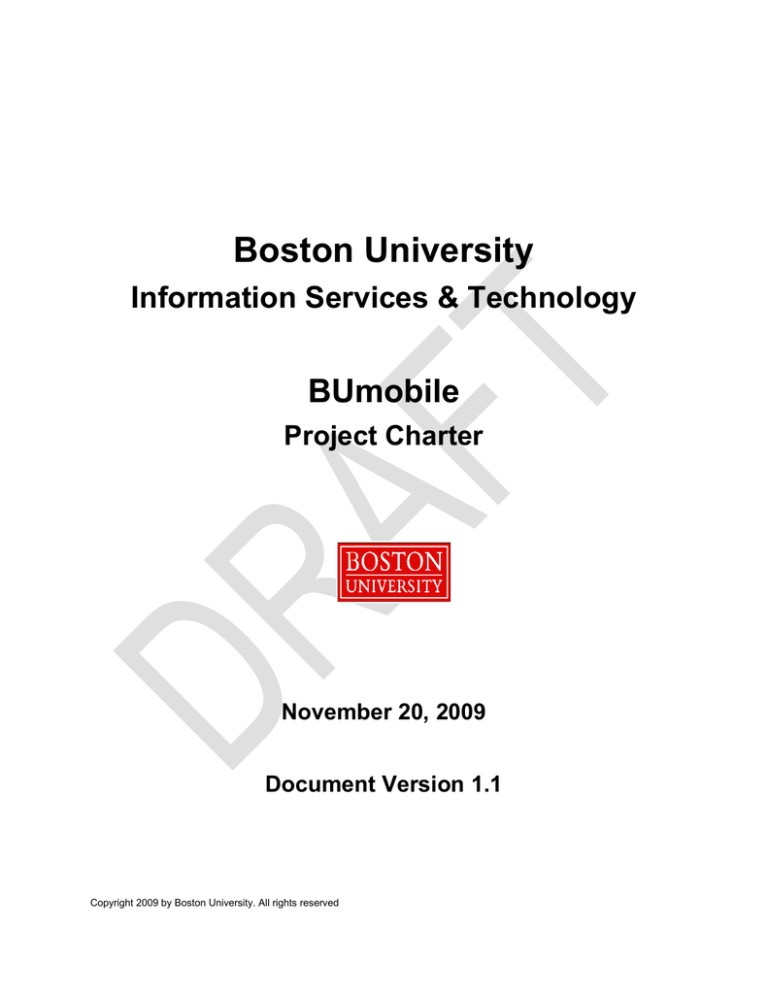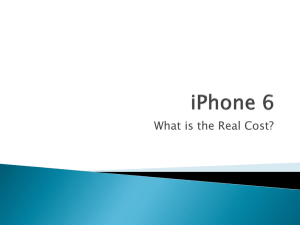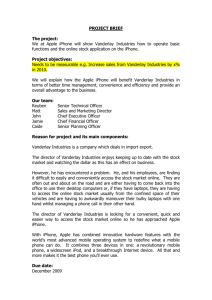
Boston University
Information Services & Technology
BUmobile
Project Charter
November 20, 2009
Document Version 1.1
Copyright 2009 by Boston University. All rights reserved
BUmobile Project Charter
Table of Contents
Revision History ......................................................................................................... 3
Executive Summary ................................................................................................... 4
Background ................................................................................................................ 4
Objectives .................................................................................................................. 5
Scope ......................................................................................................................... 5
Proposed Architecture ................................................................................................ 7
Interfaces ................................................................................................................................... 7
Implementation Approach .......................................................................................... 7
High Level Schedule ................................................... Error! Bookmark not defined.
Resources .................................................................................................................. 7
Assumptions............................................................................................................... 8
Risks .......................................................................................................................... 8
Project Charter Approvals .......................................................................................... 8
2
3/23/2016
BUmobile Project Charter
Revision History
The following is a listing of the changes that have been made to this document.
Date
Version
11/19
1
11/20
1.1
Description
Author/Editor
Created first draft
Mendez
Updates as a result of discussions in the
committee meeting on 11/19.
Mendez
3
3/23/2016
BUmobile Project Charter
Executive Summary
Two and a half years ago, the iPhone didn’t exist, and traffic to the Boston University Web from
smartphones was inconsequential. Today, traffic to the BU Web from iPhones alone represents the third
largest group of visitors. The iPod Touch is the fifth largest.
Given the rapidly growing reliance on and use of mobile devices to access the BU Web, we must create a
presence on the iPhone and other smartphones and must also optimize the BU Web for these devices, if
we are to continue to reach and serve this important segment of our own community and those interested
in our community.
This project will be a joint effort between key content and application stakeholders, New Media (NM), and
Information Services &Technology (IS&T).
Background
The iPhone and similar touch-screen smartphones are a rapidly growing segment of Web users. Several
universities (MIT, Stanford, Duke, Texas A&M, and others) have already developed a presence on the
iPhone, the most popular of these phones.
The iPhone has 33% of the touch-screen market, more than the next four competitors combined, and the
number of touch-screen phone users increased 159% from August 2008 to August 2009, according to an
article in The New York Times (11/9/2009).
Application development will initially be focused on the iPhone, because of its commanding market share
and because it dwarfs all other mobile devices in BU Web traffic. However, development will proceed in
such a way as to make deployment of those applications to other mobile devices efficient and costeffective.
IS&T has conducted some preliminary investigations into the development landscape for mobile devices,
looking at MIT’s development framework as well as Apple’s iPhone Human Interface Guidelines.
All departments with websites or web-based applications are potential future stakeholders, but the initial
key stakeholders are those departments who manage core, high-profile, widely used University content,
including:
Marketing and Communications – News, Calendar of Events, BU Directory, BU Map, BU Photo
Gallery, BU Today, BUniverse, Bostonia, and more
Admissions – Campus tours, student profile videos, and more
Registrar – Class schedules, course descriptions search, and more
Library – Catalog, licensed content, and more
Athletics – News, scores, schedules, video highlights, and more
IS&T – Link applications, other applications, Help Center, and more
Others – Bus schedule, dining menus, and more
4
3/23/2016
BUmobile Project Charter
Objectives
Our goals for creating a University presence on the iPhone and other mobile devices are not so much
different than the goals we had when we began developing University websites and web-based
applications. During Phases I and II (detailed below).
1. We want to expand access to valuable University content, including University-licensed content.
2. We want to expand opportunities for engaging and connecting with current and potential
members of our community, with colleagues and peers at other universities, and with the general
public at large.
3. We want to expand our knowledge of and expertise with the iPhone development platform and
tool set in order to become efficient and cost-effective in our development processes.
To measure our success in achieving objectives one and two, we will monitor over time the traffic to our
iPhone applications. To measure success with objective three, we have been recording time spent on
this project. And, we have already achieved a measure of success. It took our lead developer more than
one week to develop the first working prototype and less than one day to develop the second.
For applications that we will consider for future development, we also want to expand:
Opportunities for learning.
Opportunities for collaboration.
Finally, by adopting the iPhone platform early, we may also gain some public-relations advantages,
bragging rights, and accolades, though all those can be harder to measure.
Scope
Phase I
In this phase, we will develop iPhone applications from pre-existing, high-profile, and widely used
University data sources. These include:
BU Calendar
BU Directory
Course Descriptions Search
BU Today
BU Maps
We will focus on these sources during the initial development phase, because it:
Reduces development time (working, functioning prototypes were created during our preliminary
investigation effort).
Doesn’t delay the launch of completed components while discussions about more complex
components are underway.
Provides the community a compelling and valuable foundation of components to begin using.
Serves as a tangible example of the possibilities, which is likely to generate interest and ideas for
future development within the community.
In this phase, we will also develop an interface for users to suggest an idea, ask a question, or report a
problem. These inquiries will go directly into One Help, an IS&T ticket-tracking system.
5
3/23/2016
BUmobile Project Charter
Phase II
In this phase, we will develop iPhone applications from pre-existing, high-profile, and widely used
University data sources to which we do not have direct or easy access. These include:
BU Library Catalog – hosted locally using third-party software
BU Athletics – hosted externally using a third-party service
Photo galleries – hosted locally, but requiring some effort to assemble and format the content
We will focus on these sources next, because it:
Reduces development time by working with pre-existing data sources.
Doesn’t delay the launch of completed components while discussions about more complex
components are underway.
Provides the community additional compelling and valuable components.
Illustrates new development activity not long after the initial launch, and demonstrates our
commitment to mobile applications.
For Future Consideration
Like the Web, the iPhone presents unlimited opportunities for developing applications in support of
teaching, learning, research, business, collaboration, communication, commerce, and leisure. One
continuing challenge will be to balance what will surely be an avalanche of intriguing and intoxicating
ideas with the sober realities of the associated development costs.
Moving forward, there will likely be parallel streams of development work, and not all by IS&T in
partnership with New Media. Other University IT groups, research groups, and talented and motivated
individuals can and will likely develop for the iPhone. Already, a BU student has developed a very nice
BU Shuttle Bus application. It includes a schedule, nearest bus stop (using location awareness), an
integrated map, help, and settings to configure the application.
The committee discussed numerous ideas and proposals for new applications. Some will not require a
great commitment of resources or funding. IS&T and New Media should be able to build these with
existing resources. Other applications are so large and complex that they would be distinct and separate
projects. These might require their own Project Charter and approval from a higher level.
The committee discussed the following areas for possible development:
Instructional applications and a learning-objects repository
Campus tours (art tour, admissions tour, etc.)
Photo galleries – location aware, user submissions, maps connectivity
Collaboration tools
Course-management tools or integration
BU Maps and user submissions (photos, etc.)
Out of Scope
This project will not include other development efforts, such as:
Creating mobile versions of the Phase I and II applications for other mobile devices, as traffic
from those devices does not currently warrant the effort.
Mobile versions of selected portions of University websites, e.g., the SHA mobile initiative with
talks currently underway between NM and IS&T.
Development of mobile versions of existing (or in development) Link applications and other
applications, along with authentication.
We will most likely eventually do all or most of these things, but they fall outside the immediate scope of
this project.
6
3/23/2016
BUmobile Project Charter
Proposed Architecture
For Phase I and II, content from existing sources will be processed through scripts that produce output in
Atom format. This content forms the content base for the iPhone applications.
Interfaces
New Media will design and develop all interfaces for all applications created by IS&T and launched on the
iPhone and eventually on other mobile devices. Mock ups of these interfaces are on the BUmobile blog.
Implementation Approach
Phase I
Working with existing data sources to which IS&T has direct access and with which IS&T has built
working prototypes, this phase now primarily requires design work, currently underway by New Media. It
will also require some additional development work to be performed by IS&T developers. New Media and
IS&T are the primary contributors of team members during this phase.
Phase II
Working with existing data sources to which IS&T does not have direct access, we will work with data
owners to get access to their data or to get data feeds. Design of new components will be handled by
New Media. New Media, content owners, and IS&T are the primary contributors of team members during
this phase.
For Future Consideration
Because discussions of future develop are in the preliminary stage, it is premature to define an
implementation approach. However, the approach will be similar to other iPhone development projects.
High Level Schedule
Below is a high-level launch schedule.
Date
Completion and Launch of
January
Phase I
February
Phase II
To be determined
For Future Consideration
7
3/23/2016
BUmobile Project Charter
Resources
For Phases I and II, resource requirements are as follows:
Hardware – No new hardware is required for this project.
Software – No new software is required for this project.
3rd Party Services – Apple development tools are required for this project.
Internal staff augmentation – Phase I and II are to be completed with existing staff.
Existing internal staff – hours estimate – To date, no official estimate has been produced.
However, 242 hours have been recorded on this project since initial investigation began in June
2009.
Assumptions
The following assumptions are being made regarding key success factors for this project:
IS&T development resources will remain available for development.
New Media design resources will remain available for design.
Content owners will make their content available.
Risks
For Phases I and II, risks are listed below.
Risk
Likelihood
Impact
For content not directly accessible to IS&T, content
owners do not grant access or deliver data in a
timely manner.
Medium
Launch of affected
applications delayed.
Apple does not approve our initial iPhone
application.
Low
Launch of application
delayed.
Project Charter Approvals
Project Sponsors:_Names_______________________ Date:___/___/___
Project Business Owners___Names_____________________________________
Date___/___/___
IS&T Project Manager___Name______________________________Date:___/___/___
The above signees agree with the contents of this charter and authorize the approval of this project.
8
3/23/2016




